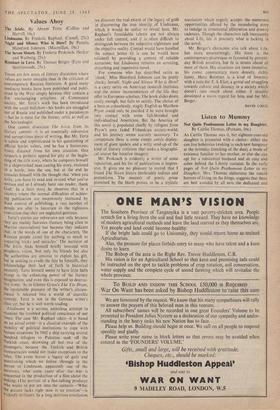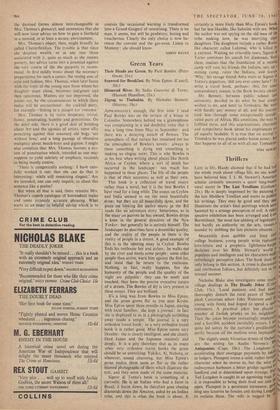Listen to Mummy
As Caitlin Thomas sees it, her eighteen-year-old daughter is presented with a choice: either she can live bohemian (waking to each new hangover at the noonday knocking of the dun), a mode of existence familiar to her mother, or else she can opt for a substantial husband and sit cosy and sober behind the Liberty curtains. In the early pages of Not Quite Posthumous Letter to my Daughter, Mrs. Thomas elaborates the rancid horrors of living on the fringe, suggests that these are best avoided by all save the dedicated and
the damned (terms almost interchangeable in Mrs. Thomas's glossary), and announces that she will now issue advice on how to gain a foothold in a monied, or at least a secure, environment.
Mrs. Thomas's object, then, might broadly be called Chesterfieldian. The trouble is that since she despises wealth, or at any rate those associated with it, quite as much as she resents poverty, her advice turns into a jeremiad against the very course of life she purports to recom- mend. At first mildly ironic about the necessary preparations for such a career, the vexing uses of style and fashion, Mrs. Thomas, when later faced with the topic of the young men from whom her daughter must chose, becomes indignant and then rancorous. Matters are not improved, she points out, by the circumstances in which these males will be encountered: the cocktail party, for example—`fishing in a pisspot for romance.'
Mrs: Thomas is by turns desperate, trivial, funny, penetrating, humble and pretentious. On the debit side, there is a good deal of humbug about Art and the agonies of artists, some silly preaching against that seasoned old bogy 'sex without love,' and a long passage of obsessive malignity about beach-boys and gigolos. I might also complain that Mrs. Thomas favours a sys- tem of punctuation which, intended as one may suppose to yield subtlety of emphasis, succeeds in being merely costive.
`There is categorically nothing: I have care- fully worked it out; that she can do that is interesting: while still remaining elegant.' Are we intended, one can only inquire, to chant this sentence like a psalm?
But when all that is said, there remains Mrs. Thomas's superb catalogue of horrendous males and some viciously accurate phrasing. What starts as art essay in helpful advice which is to
contain the occasional warning is transformed into a Grand Guignol of moralising. There is no man, it seems, but will be predatory, boring and treacherous. Clearly the only choice is now be- tween the convent and the gas-oven. Listen to Mummy: she should know. SIMON RAVEN































 Previous page
Previous page